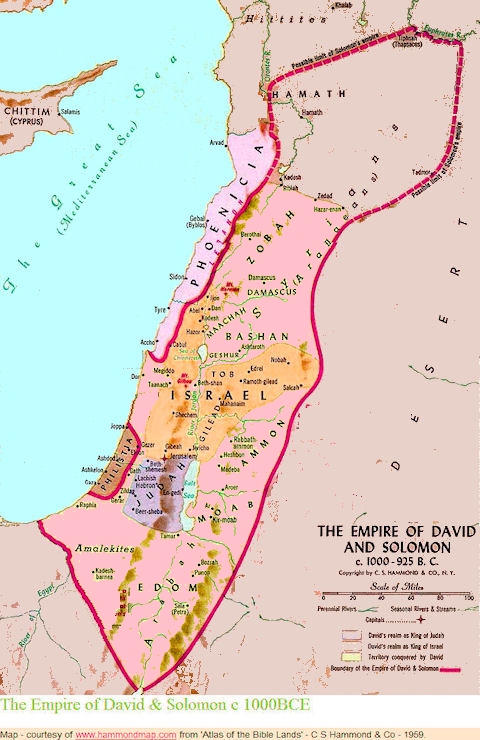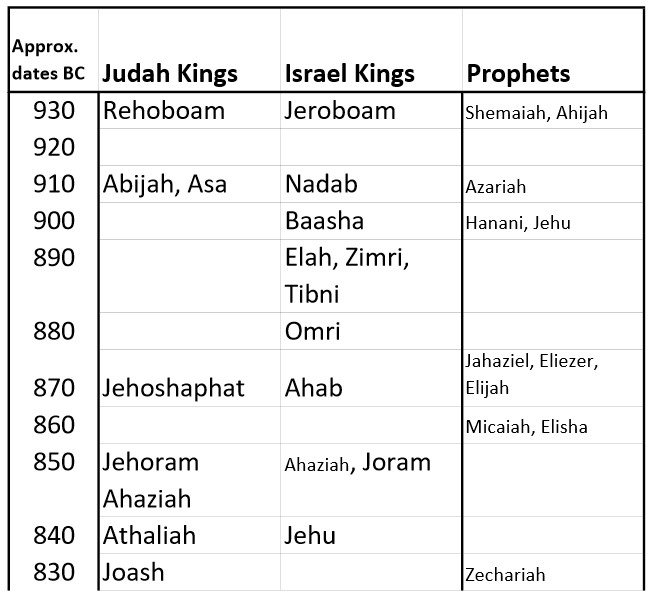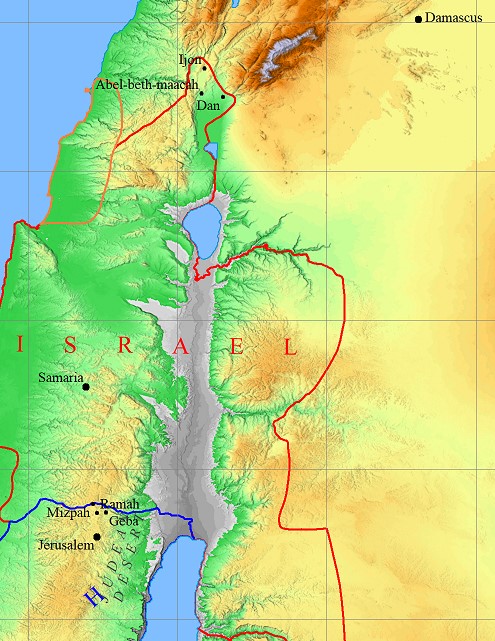For those who have been reading through these studies sequentially, ‘Elijah’ covered much of 1 Kings 17 to 2 Kings 2. However some was deliberately skipped, so this study recaps and we will turn our attention away from Israel to the north, and see what was happening in Judah to the south. We will also be using material from 2 Chronicles.
Following the death of Solomon, the kingdom literally ‘fell apart’
(Display or hand out copies of this map from HERE)

What used to be a vast empire had contracted to two territories ruled by rival kings. From its inception, the northern territory named ‘Israel’ was ruled by godless wicked kings who consistently turned their backs on God. One king, Jehu (11th out of 20 kings) , started well - but
Read 2 Kings 10:28-31
28 So Jehu destroyed Baal worship in Israel. 29 However, he did not turn away from the sins of Jeroboam son of Nebat, which he had caused Israel to commit – the worship of the golden calves at Bethel and Dan.
30 The Lord said to Jehu, ‘Because you have done well in accomplishing what is right in my eyes and have done to the house of Ahab all I had in mind to do, your descendants will sit on the throne of Israel to the fourth generation.’ 31 Yet Jehu was not careful to keep the law of the Lord, the God of Israel, with all his heart. He did not turn away from the sins of Jeroboam, which he had caused Israel to commit.
As we will discover, this pattern of sin led to their eventual permanent exile under the Assyrians.
The southern Kingdom, known by the name of its dominant tribe ‘Judah’ fared somewhat better but although many Kings were Godly, there were exceptions. Then the last four turned their backs on God and that too finally led to the Babylonian exile.
The first King of Judah was Rehoboam, son of Solomon. He began well.
Read 2 Chronicles 11:13-14
13 The priests and Levites from all their districts throughout Israel sided with him. 14 The Levites even abandoned their pasture-lands and property and came to Judah and Jerusalem, because Jeroboam and his sons had rejected them as priests of the Lord.
Following ‘Partition’ there was a mass exodus of priests and people who were prepared to give up even their God-given inheritance in order to distance themselves from their apostate king.
Read 2 Chronicles 11:16-17
16 Those from every tribe of Israel who set their hearts on seeking the Lord, the God of Israel, followed the Levites to Jerusalem to offer sacrifices to the Lord, the God of their ancestors. 17 They strengthened the kingdom of Judah and supported Rehoboam son of Solomon for three years, following the ways of David and Solomon during this time.
Did you notice ‘for three years’ in the last verse? What happened after that?
Read 2 Chronicles 12:1
1 After Rehoboam’s position as king was established and he had become strong, he and all Israel with him abandoned the law of the Lord.
(We looked at this in 1Kings(i) - 1 Kings 14:21-31)
(Note ‘all Israel’. Often the Chronicler referred to ‘Israel’ when he was writing about ‘Judah’. He was writing for those who had survived the exile of Judah under the Babylonians – and these returning remnants had adopted the name ‘Israel’.)
How quickly the people followed the king’s example of disobedience, and our studies will show how difficult it is for a king to lead his people back.
Read 2 Chronicles 12:14, 16 then 2 Chronicles 13:1-3
14 He did evil because he had not set his heart on seeking the Lord.
16 Rehoboam rested with his ancestors and was buried in the City of David. And Abijah his son succeeded him as king.
1 In the eighteenth year of the reign of Jeroboam, Abijah became king of Judah, 2 and he reigned in Jerusalem for three years. His mother’s name was Maakah, a daughter of Uriel of Gibeah.
There was war between Abijah and Jeroboam. 3 Abijah went into battle with an army of four hundred thousand able fighting men, and Jeroboam drew up a battle line against him with eight hundred thousand able troops.
Consistently the writer of 1 and 2 Chronicles tried to show Judah and it’s kings in the best possible light – the writer of 1 and 2 Kings is not so kind. So first we will read 1 Kings 15:3-4 concerning Abijah:
3 He committed all the sins his father had done before him; his heart was not fully devoted to the Lord his God, as the heart of David his forefather had been. 4 Nevertheless, for David’s sake the Lord his God gave him a lamp in Jerusalem by raising up a son to succeed him and by making Jerusalem strong.
With that in mind we can continue in 2 Chronicles 13:4-18 where we have Abijah addressing the armies of Judah ranged against him:
4 Abijah stood on Mount Zemaraim, in the hill country of Ephraim, and said, ‘Jeroboam and all Israel, listen to me! 5 Don’t you know that the Lord, the God of Israel, has given the kingship of Israel to David and his descendants for ever by a covenant of salt? 6 Yet Jeroboam son of Nebat, an official of Solomon son of David, rebelled against his master. 7 Some worthless scoundrels gathered around him and opposed Rehoboam son of Solomon when he was young and indecisive and not strong enough to resist them.
8 ‘And now you plan to resist the kingdom of the Lord, which is in the hands of David’s descendants. You are indeed a vast army and have with you the golden calves that Jeroboam made to be your gods. 9 But didn’t you drive out the priests of the Lord, the sons of Aaron, and the Levites, and make priests of your own as the peoples of other lands do? Whoever comes to consecrate himself with a young bull and seven rams may become a priest of what are not gods.
10 ‘As for us, the Lord is our God, and we have not forsaken him. The priests who serve the Lord are sons of Aaron, and the Levites assist them. 11 Every morning and evening they present burnt offerings and fragrant incense to the Lord. They set out the bread on the ceremonially clean table and light the lamps on the gold lampstand every evening. We are observing the requirements of the Lord our God. But you have forsaken him. 12 God is with us; he is our leader. His priests with their trumpets will sound the battle cry against you. People of Israel, do not fight against the Lord, the God of your ancestors, for you will not succeed.’
13 Now Jeroboam had sent troops round to the rear, so that while he was in front of Judah the ambush was behind them. 14 Judah turned and saw that they were being attacked at both front and rear. Then they cried out to the Lord. The priests blew their trumpets 15 and the men of Judah raised the battle cry. At the sound of their battle cry, God routed Jeroboam and all Israel before Abijah and Judah. 16 The Israelites fled before Judah, and God delivered them into their hands. 17 Abijah and his troops inflicted heavy losses on them, so that there were five hundred thousand casualties among Israel’s able men. 18 The Israelites were subdued on that occasion, and the people of Judah were victorious because they relied on the Lord, the God of their ancestors.
I thought it significant that although Abijah could boast of the Priests, and their service in the Temple – ‘observing the requirements of the Lord our God’ he did not demonstrate a personal faith like David. They had entered the battle confident that their God would give them victory, but it was only when they were desperate that they actually called out to the Lord for his help (v14).

Who followed Abijah as King of Judah?
Read 2 Chronicles 14:1-6 (You could read the whole chapter but I’ve been selective to save time!)
1 And Abijah rested with his ancestors and was buried in the City of David. Asa his son succeeded him as king, and in his days the country was at peace for ten years.
2 Asa did what was good and right in the eyes of the Lord his God. 3 He removed the foreign altars and the high places, smashed the sacred stones and cut down the Asherah poles. 4 He commanded Judah to seek the Lord, the God of their ancestors, and to obey his laws and commands. 5 He removed the high places and incense altars in every town in Judah, and the kingdom was at peace under him. 6 He built up the fortified cities of Judah, since the land was at peace. No one was at war with him during those years, for the Lord gave him rest.
Following this there was an abortive attack from the Cushites. (Cush was a nation possibly situated around the Nile, on the borders of modern Egypt and Sudan)
Read 2 Chronicles 14:11-12
11 Then Asa called to the Lord his God and said, ‘Lord, there is no one like you to help the powerless against the mighty. Help us, Lord our God, for we rely on you, and in your name we have come against this vast army. Lord, you are our God; do not let mere mortals prevail against you.’
12 The Lord struck down the Cushites before Asa and Judah. The Cushites fled,
Now read 2 Chronicles 15:1-8
The Spirit of God came on Azariah son of Oded. 2 He went out to meet Asa and said to him, ‘Listen to me, Asa and all Judah and Benjamin. The Lord is with you when you are with him. If you seek him, he will be found by you, but if you forsake him, he will forsake you. 3 For a long time Israel was without the true God, without a priest to teach and without the law. 4 But in their distress they turned to the Lord, the God of Israel, and sought him, and he was found by them
5 In those days it was not safe to travel about, for all the inhabitants of the lands were in great turmoil. 6 One nation was being crushed by another and one city by another, because God was troubling them with every kind of distress. 7 But as for you, be strong and do not give up, for your work will be rewarded.’
8 When Asa heard these words and the prophecy of Azariah son of Oded the prophet, he took courage. He removed the detestable idols from the whole land of Judah and Benjamin and from the towns he had captured in the hills of Ephraim. He repaired the altar of the Lord that was in front of the portico of the Lord’s temple.
Note ‘he took courage’. It seems that fighting an enemy 'without', might have been easier that fighting the enemy 'within'.
As part of the celebrations that followed the defeat of Cush, we read (2 Chronicles 15:12-19)
12 They entered into a covenant to seek the Lord, the God of their ancestors, with all their heart and soul. 13 All who would not seek the Lord, the God of Israel, were to be put to death, whether small or great, man or woman. 14 They took an oath to the Lord with loud acclamation, with shouting and with trumpets and horns. 15 All Judah rejoiced about the oath because they had sworn it wholeheartedly. They sought God eagerly, and he was found by them. So the Lord gave them rest on every side.
16 King Asa also deposed his grandmother Maakah from her position as queen mother, because she had made a repulsive image for the worship of Asherah. Asa cut it down, broke it up and burned it in the Kidron Valley. 17 Although he did not remove the high places from Israel, Asa’s heart was fully committed to the Lord all his life. 18 He brought into the temple of God the silver and gold and the articles that he and his father had dedicated.
19 There was no more war until the thirty-fifth year of Asa’s reign.
So the land of Judah can settle into a period of peace and (probably) prosperity. But it couldn’t last . . .
(We covered the following in 1 Kings(i) but I felt it right to include it here for completeness – now looking at it from Judah’s point of view.)
1 Kings paints a different picture:
1 Kings 15:16 There was war between Asa and Baasha king of Israel throughout their reigns.
We saw earlier that there had been a mass exodus of people from north to south. Possibly this had continued over the years and finally the king of Israel decided it had to be stopped.
Read 2 Chronicles 16:1
1 In the thirty-sixth year of Asa’s reign Baasha king of Israel went up against Judah and fortified Ramah to prevent anyone from leaving or entering the territory of Asa king of Judah.
Also I presumed earlier that this was an early form of ‘economic warfare’ as Ramah was a border town on the main north-south trade route.
How should Asa respond? What would David have done?
Read 2 Chronicles 16:2-6
2 Asa then took the silver and gold out of the treasuries of the Lord’s temple and of his own palace and sent it to Ben-Hadad king of Aram, who was ruling in Damascus. 3 ‘Let there be a treaty between me and you,’ he said, ‘as there was between my father and your father. See, I am sending you silver and gold. Now break your treaty with Baasha king of Israel so that he will withdraw from me.’

4 Ben-Hadad agreed with King Asa and sent the commanders of his forces against the towns of Israel. They conquered Ijon, Dan, Abel Maim and all the store cities of Naphtali. (Abel-Maim = Abel Beth Maakah on map)
5 When Baasha heard this, he stopped building Ramah and abandoned his work. 6 Then King Asa brought all the men of Judah, and they carried away from Ramah the stones and timber Baasha had been using. With them he built up Geba and Mizpah.
What is your immediate reaction? Was this a smart military decision? Would you have done the same?
It wasn’t what God intended, and Asa hadn’t thought to ask.
Read 2 Chronicles 16:7-10
7 At that time Hanani the seer came to Asa king of Judah and said to him: ‘Because you relied on the king of Aram and not on the Lord your God, the army of the king of Aram has escaped from your hand. 8 Were not the Cushites and Libyans a mighty army with great numbers of chariots and horsemen? Yet when you relied on the Lord, he delivered them into your hand.
9 For the eyes of the Lord range throughout the earth to strengthen those whose hearts are fully committed to him. You have done a foolish thing, and from now on you will be at war.’
10 Asa was angry with the seer because of this; he was so enraged that he put him in prison. At the same time Asa brutally oppressed some of the people.
What a sad end to a promising reign.
We had read in 2 Chronicles 15:17 Asa’s heart was fully committed to the Lord all his life. But now it seems that after a lifetime of ease, he, like Solomon, had drifted away from the Lord.
Is there something we need to learn here?
Read 2 Chronicles 16:11-14
11 The events of Asa’s reign, from beginning to end, are written in the book of the kings of Judah and Israel. 12 In the thirty-ninth year of his reign Asa was afflicted with a disease in his feet. Though his disease was severe, even in his illness he did not seek help from the Lord, but only from the doctors. 13 Then in the forty-first year of his reign Asa died and rested with his ancestors. 14 They buried him in the tomb that he had cut out for himself in the City of David. They laid him on a bier covered with spices and various blended perfumes, and they made a huge fire in his honour.






